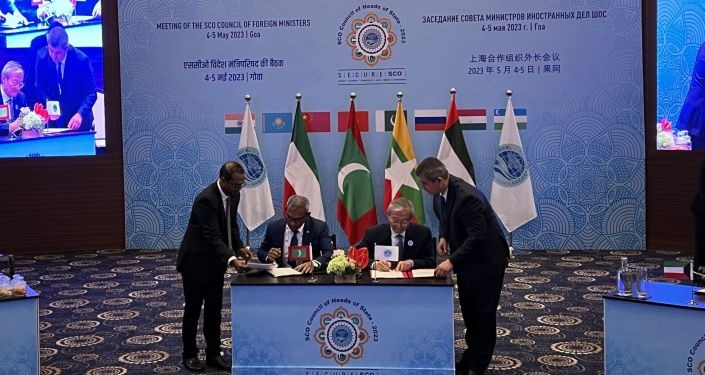
On May 5, 2023, in Panaji (Republic of India), on the sidelines of a meeting of the Council of Foreign Ministers of the SCO Member States, a signing ceremony of Memorandums on granting the State of Kuwait, the Republic of the Maldives, the Republic of the Union of Myanmar and the United Arab Emirates the status of a SCO dialogue partner took place.
On behalf of the SCO, the Memorandums were signed by the Secretary General of the Organization Zhang Ming, on behalf of the countries receiving the status – Ambassador Extraordinary and Plenipotentiary of the State of Kuwait to the Republic of India Jasem Ibrahim Al-Najim, High Commissioner of the Republic of Maldives to the Republic of India Ibrahim Shahib, Ambassador Extraordinary and Plenipotentiary of the Republic of the Union of Myanmar in the Republic of India Mo Kyaw Aung, Ambassador Extraordinary and Plenipotentiary of the United Arab Emirates to the Republic of India Abdulnasser Jamal Hussain Mohammed Ash-Shaali.
The ceremony marked the completion of legal procedures for the implementation of the relevant decision adopted at the meeting of the Council of Heads of SCO Member States in Samarkand (Republic of Uzbekistan) in 2022.
According to the Memorandums, the above-mentioned countries intend to cooperate within the framework of the SCO in the areas of regional security and stability, trade and investment, energy, ICT, agriculture, transport and communications, culture, science and technology, education, healthcare and tourism.
The status of a dialogue partner gives the right to take part in specialized events within the framework of the SCO at the invitation of member states.
Also on the sidelines of the meeting of the Council of Foreign Ministers of the countries of the Shanghai Cooperation Organization, the Minister of Foreign Affairs of the Russian Federation Sergey Lavrov met with the Minister of Foreign Affairs of the People’s Republic of China Qin Gang and the Minister of Foreign Affairs of the Republic of India S. Jaishankar, the Foreign Ministry website reports.
Issues related to the implementation of the agreements reached during the talks between President of the Russian Federation Vladimir Putin and President of the People’s Republic of China Xi Jinping in Moscow on March 20-21 this year were discussed with the Chinese colleague. A number of topical topics on the bilateral agenda were considered, including individual projects of cooperation in practical areas.
The heads of foreign policy of the Russian Federation and China exchanged assessments of the current state and prospects for further development of the activities of the Shanghai Cooperation Organization. The Ministers welcomed the collective efforts of the Member States to maintain peace and stability in Eurasia, stated the growing authority of the Organization in world affairs and its key importance in the regional security architecture.
The mutual intention to build up mutual coordination in the UN, SCO, BRICS, RIC, the G20 and other key international organizations and dialogue mechanisms was confirmed. A number of “hot” topics were discussed, including efforts to peacefully resolve the Ukrainian crisis.
A confidential exchange of views was held on topical international issues with an emphasis on the state of affairs in the Asia-Pacific region in the context of the increased activity of extra-regional players to create various narrow-bloc formats that undermine the aseanocentric system of security and stability in the Asia-Pacific region.
Sergey Lavrov exchanged views with his Indian counterpart S. Jaishankar on the main issues of bilateral relations, including the schedule of upcoming contacts, as well as topical issues on the global and regional agenda. The ministers highly appreciated the dynamics of cooperation in key areas of the especially privileged strategic partnership between our countries.
The intention was confirmed to strengthen coordination activities to develop common approaches within the framework of interaction at the most important international platforms, including the SCO, BRICS, the UN and the G20.
The parties agreed to continue following the course of building a fair multipolar system of interstate relations.

Location: 103 Kurortniy Prospekt, Sochi, Russia. The Radisson Lazurnaya Hotel
There must be time
Here are the terms of participation
Comments
0